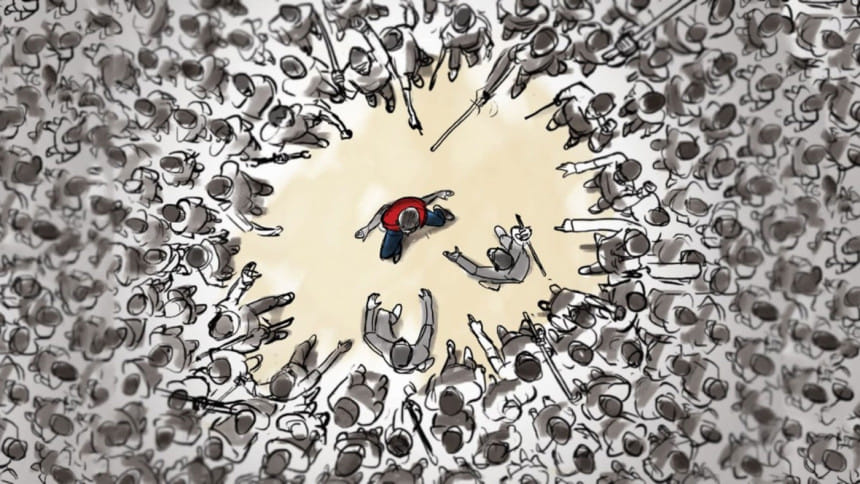The burning man, and our national addiction to violence

Barely a month had passed since one of us wrote about rape, scopophilia and collective rage, and barely a day since we began an intergenerational dialogue on gender, rage and violence, full of hope at the emergence of passionate and resourceful young allies, when the world dutifully punched back. Social media was suddenly ablaze with the news of a man who had been lynched by a mob and set on fire. The sight should have provoked rage and indignation; instead it produced a deep sense of loss. Only hours before, during that same discussion on feminine rage, veteran activist Shireen Huq had spoken of the sheer indignity at the heart of our social existence. Tragedy certainly has timing.
On October 29, two men went inside the Burimari Jam-e-Masjid after Asr prayers (some reports suggest that they had prayed). According to a Union Parishad member, "One of the men went inside the mosque with the khadim, Zubed Ali, before searching the bookshelf at the prayer hall claiming that firearms were hidden behind Quran and Hadith books." Zubed Ali himself stated: "At one point, five or six worshippers, who were outside the mosque, entered and dragged the man to the stairs outside before starting to beat him and the other man was waiting outside the hall… Soon after [UP] Member Hafizul Islam intervened and took the men away from there. I don't know what happened to them after that." As it is, we do. We know that Hafizul Islam could not protect the man. That a mob broke into the UP office, snatched one of the men, lynched him right outside, and eventually set him on fire. We know that thousands of spectators gathered to witness this "rapid action" trial and execution. That police and local administration rushed to the scene but could not stop the carnage.
So here we go again: collective violence as discipline and punishment, theatre and spectacle, captured on video and "viral" in a matter of hours. In the aftermath, we see more of the same—one camp justifying the lynching, and another searching for the "real" Islam and cursing humanity. We are not interested in either—instead, we would like to direct some attention towards this all-consuming rage and insatiable appetite for violence within us. Our fragile "honour" is easily hurt, our entitlements are many, and our only medium of expression appears to be vengeful and misplaced rage—our national language. A report by The Daily Star tells us that 63 percent of men in Bangladesh think it justified to beat women if denied sex, while we are awash in endless rape cases flooding the country. Meanwhile people parade with severed hands, vandalise Durga temples, set pagodas on fire, and perish in extra-judicial killings. No, the mob is not "the poor", not "illiterate brutes"; the mob is all of us. Our impotent rage on social media makes us collaborators—we choose not to speak up or hold anyone accountable. The "culture of impunity" is also a culture of apathy, while even our aspirations for justice have become trapped in the language of violence, a perpetual "fanshi chai".
Somewhere along the way we have decided that all human beings are not born with a right to be, to live with dignity and without perpetual fear. Instead we have turned the right to exist and prosper into a privilege, and declared: "Take it if you can! Prove your worth!" It matters little who we trample, whose houq we deny. There is an old name for this "ethic": might is right, once used by our former colonisers to justify their own dominion; and here we thought we had "decolonised"! We have forgotten that to be born into a world of others is to be answerable for our actions. We do not recognise this mutual obligation, instead retreating inwards and treating the world as a stage to enact our performances. It is no surprise, then, that our sense of self comes from self-gratification. Whether it is a thirst for prestige or vengeance—it must be gratified and "televised".
What these repeated bursts of collective rage suggest to us is a world of abandonment, something we have stressed before. Why we rage is also why the "official health guidelines" for Covid-19 could not be enforced, triggering much talk-show frustration—we simply do not believe that we live in a society that takes care of itself, nor indeed that such a society can even exist. And who can blame us, in this land of lynching and gang rape? The man who died, Abu Yunus Muhammad Shahidunnabi "Jewel", was a teacher and a librarian at Rangpur Cantonment Public School and College. He had lost his job due to the pandemic and was possibly mentally unstable. At least two of his students have come out in his defence—both their testimonies and his Facebook page suggests that he was a practicing Muslim with two young children. He was not a local in Burimari and had gone there to visit. He had obviously become triggered by something, and was reportedly incoherent at the mosque; he ended up paying for that with this life.
A nation that fails to protect its most vulnerable citizens needs to search its soul. Who are we at war with, that we resort to violence with such ease? This is neither 1947 nor 1971, nor indeed do we answer to a military autocrat. We are citizens of a sovereign state, a parliamentary democracy, but one where we can rob each other of life and dignity without being held accountable. Let us remind ourselves that there is a difference between a "monarchy" and a modern state; the sovereign is not supposed to hold the power to "grant" life or death anymore. Chest-thumping over having outperformed our neighbour is easier than confronting this blinding whirlpool of helplessness and rage, where everyone is left to fend for themselves. Abandonment is the general condition of our being, breeding this ethic of vengeance and vigilantism. We have normalised violence in our politics and in our everyday lives, enabling this culture of rage and impunity—our very own "How to Get Away with Murder." It does not even shock us that sitting MPs should recommend "crossfire" to eliminate rapists, since they already use it for "drug dealers"—why not simply lock up our courts and throw away the keys?
"The Third World was not a place. It was a project," wrote Vijay Prashad. We were born through struggle, fed by the aspirations of millions for a more equal, just and caring world, where we could come together to become "masters of our own destinies." Certainly, there were gaps and violent contradictions; yet instead of pushing and expanding, we have abandoned the project altogether. It is time to reclaim our state, and begin again the work of transforming it into an instrument of self-determination and nurture. For too long we have been "outsourcing" our responsibilities—poverty? Microfinance! Social justice? NGOs! Justice? Up for grabs! A nurturing state must uphold our collective responsibility to ensure each other's well-being, to protect each other, and to create the conditions where each one of us can flourish and live with dignity. Our 50th year is on the horizon; it is time now to confront ourselves, with honesty and purpose, and ask if this is who we want to be. Make no mistake, to call for a nurturing state is not a call for "turning the other cheek"; it is to struggle relentlessly against all structures, practices and institutions that allow some to diminish, reduce and exploit others for gain, power or prestige. We of all people should know that liberation is inevitable; it is always a question of time.
Seuty Sabur and Shehzad M Arifeen teach Anthropology at the Department of Economics and Social Sciences, School of Humanities and Social Sciences, Brac University.


 For all latest news, follow The Daily Star's Google News channel.
For all latest news, follow The Daily Star's Google News channel. 



Comments